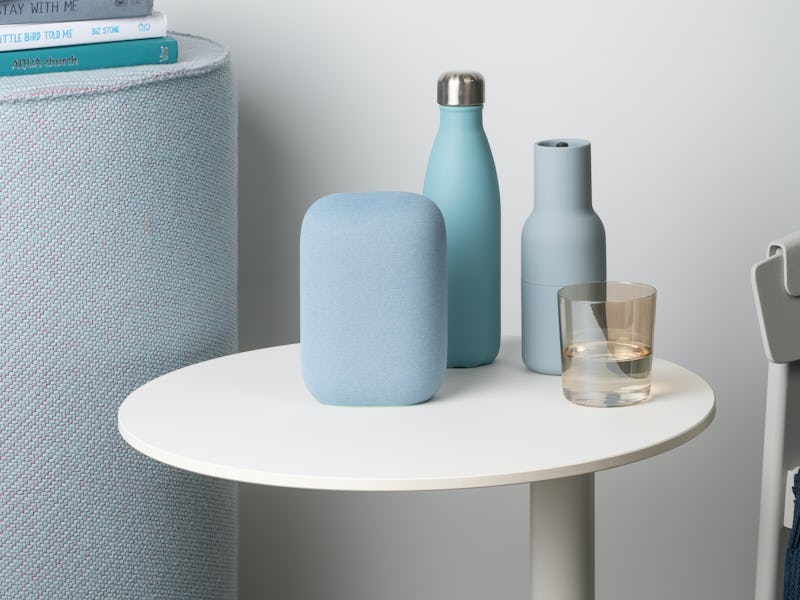Smart Speakers Have Peaked. Amazon and Google Don't Seem to Care.
Jamming a voice assistant into a speaker used to be the hottest thing a tech company could do. Now it's as tired as Instagram Stories.

We might be ready to leave smart speakers behind. Don’t believe me? Look at this week’s introduction of the Sonos Era 100 and Era 300 speakers. Sonos is all in on spatial audio for the future of its audio lineup but curiously seems to have de-emphasized the speakers’ ability to connect you to voice assistants like Amazon Alexa, even removing access to some services its older products supported.
The heated competition over who could deliver the de facto voice assistant experience, packaged up in affordable soft-touch fabrics and customizable finishes, seemed like it could be the next big product category in tech. But a pandemic, difficulty in releasing new voice assistant breakthroughs, and the realization that some things are better left for an interface you can see have slowed smart speaker releases from a steady stream to a trickle. The best of “audio equipment you can talk to” could very well be behind us.
A New Era
The new Sonos Era speakers are fantastic, but it’s clear voice assistants are no longer the focus.
The Era 300 and Era 100 ship without access to Google Assistant, which is unusual, considering a big part of the earlier Sonos One pitch offered access to Alexa and Google Assistant on the same device. Complicating things is Sonos’ tricky relationship with the search giant. It sued Google for patent infringement in 2020 over its multiroom audio features and won in a ruling delivered by the International Trace Commission. In response to the victory (though not officially), Google sued Sonos over the company’s then-new voice controls, claiming it violated Google’s patents.
Sonos has denied removing Google Assistant from the Era speakers is part of its ongoing legal battle with the voice assistant’s creator. Still, it is perhaps a sign that for the average person in the market for a connected speaker, having voice assistant representation is less critical than it once was.
Stalled Development
The Echo Dot with Clock is Amazon’s latest smart speaker but a small upgrade in comparison to the company’s other releases.
The general tact of the companies pushing the smart speaker category could be to blame. It’s been three years since Google introduced the Nest Audio speaker, and no new Google Assistant functionality appears to be on the horizon (though Google I/O is right around the corner starting on May 10). Amazon’s offered more regular updates to its Echo smart speakers, but nothing as groundbreaking as earlier versions.
To be fair, Google seems preoccupied with responding to the growing interest in generative AI and chatbots. And as of last year, Amazon considered cutting its historically unprofitable Alexa division to shore up the company during the recession. But it's surprising things are plateauing, considering how critical smart speakers seemed to these companies’ strategies.
A larger issue that Amazon and Google’s popular Echo Show and Nest Hub smart displays have identified is despite the ambitious goal of “ambient computing,” some things are better handled by a screen or buttons. Not everyone wants to shout for what they want throughout the day.
You could point to Apple as the sole outlier, considering it recently started making its larger HomePod again, but to do that, you’d have to ignore the years Siri has lain dormant, with only the occasional change in interface or functionality, since Apple started the voice assistant craze on the iPhone 4S.
Peak Smart Speaker
There’s a term used in the television industry that might accurately describe the state of smart speakers and the other recent booms and busts of the tech industry: Peak TV. The term was coined to describe the rapidly approaching saturation point in television exacerbated by the popularity of streaming. Money was being burned on more and more niche shows on different streaming services but not necessarily finding new subscribers to match the pace of spending. Sure, there was a show for everyone, but it couldn’t last. The past few years of cancellations and general contraction were the natural response, and it doesn’t seem to be stopping anytime soon.
Smart speakers and the voice assistants that run on them were similarly popular. But either because of oversaturation or the fact that figuring out new uses for a smart speaker takes more time than figuring out smartphone features, “Peak Smart Speaker” could be over without us even realizing it. Will anyone even miss it? I asked tech’s new darling, ChatGPT, and got this:
In general, whether or not someone will miss smart speakers likely depends on their personal experience and preferences. Some people may have come to rely on the convenience and functionality that smart speakers provide, while others may feel that they can live without them. Ultimately, the future of smart speakers will likely depend on their ability to address privacy concerns and provide a valuable experience to their users.
How helpful.